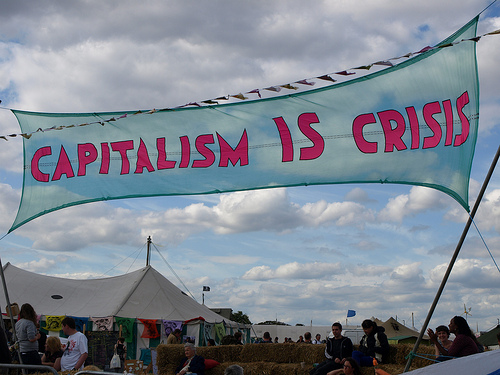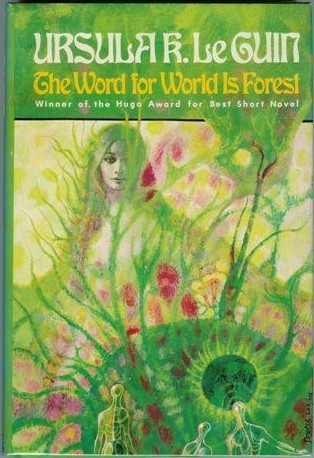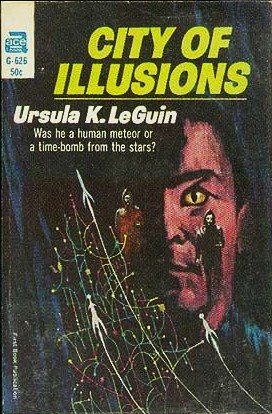September 12, 2009
Anti-organic anti-capitalism

So it is ... and that's why crises pose no kind of threat to it...
I'm in no position to comment directly on Climate Camp, since I haven't visited it. For a far more informed perspective than I could give, take a look at this post by Alex of
Je Est Un Autre, which I've meant to link to for some time now. But what troubles me - what, in fact, provokes a repulsion and hostility in me - is captured very well by the the opposition that Owen sets up - or rather observes as having already been set up - in his excellent post. What Owen saw in Blackheath - the nauseating candyfloss pleasure of the funfair on one side, the earnest agrarianism of Climate Camp on the other - recalls the structuring opposition in the novels of Ursula Le Guin. Most famously in The Dispossessed but also in City Of Illusions and The Word For World Is Forest, Le Guin opposes an artificial, toxic and consumer city (in all of these words become practically synonymous for Le Guin) with a "natural", organic, anarchist settlement, a kind of mitigated - or to use Le Guin's own term "ambiguous" - utopia, in which privation, asceticism and the dangers or hierarchy are by no means glossed over. Some of the most powerful passages in The Dispossessed describe the literally poisonous nature of the capitalist planet Urras to those used to the spartan conditions on the breakaway anarchist world Anarres. Capitalism, for Le Guin as much as for Burroughs, becomes a system of addictions.
The reason that this is so pertinent now is that, as Owen's post implies, the opposition that Le Guin keeps returning to still marks the limits of political possibilities. "Whatever organised resistance there is in Britain," writes Infinite Thought,"it looks like this: unable to formulate a properly economic response to the economic crisis, whatever opposition to the undead spectacle of neoliberalism there is has found itself moored on the shores of environmentalism and the odd industrial strike." Capitalist realism projects its own outside, and my suspicion is that the kind of anticapitalism for which Climate Camp seems to stand constitutes an "alternative" which is not uncongenial to it. CR wants us to have to choose between the sweet sickness of modernity and some agrarian "return to nature", (which contains all kinds of other wretched "returns": to the "local", to the "idiocy of rural life" that Marx and Engels rightly castigated). Or rather: by already incorporating the "local" and "the organic" - albeit in a partly simulated form - it presents itself as already containing these two possibilities. The real alternative consists in what is unthinkable now: an anti-capitalism that is also anti-organic.
 |  |
Alex Autre disputes my claim that the anti-Climate Change movement is emptily consensual, but I still don't think that there is anything particulary controversial about saying that capitalism is now the prime cause of climate change. Everyone - in the sense of the big Other - can accept this, which is precisely why a film like Wall-E, which places the blame for environmental disaster firmly with multinational corporations, can be produced in the gleaming citadel at the heart of capitalism. The problem is of a different order - it concerns not the belief that capitalism causes environmental depredation, but the sense that anything could be done about it. That's why I'm profoundly sceptical of any campaign based on spreading the magical elixir "awareness", with its implication that the main reason people don't live in ecotopia is that they don't "know" things, or that, as soon as they do know, a critical mass will be achieved that will force change. It seems to me, however, that the problem is not lack of awareness: the actual issues are organisational and libidinal.
As Savonarola puts it in Owen's comments box:
- there's something frightening about the idea that 61 million people pissing on hay is somehow easier to think about than expanding public transport and minimizing car use, that lifestyle changes that as collective experiences would be catastrophic (and more or less depend on the - by no means farfetched - possibility of catastrophe, when what is today enjoyable as utopia is tomorrow imposed as grim necessity) are easier to fathom than actual shifts in social relations. So it's perhaps no longer a question of the end of capitalism being unimaginable, à la Jameson. We can imagine that end, but we can't imagine anything after it except something that simply isn't a social system, but only a magical convergence of lifestyles and good will, happily inured to Hobbesian horizons or Weberian imperatives.
But we must start with problems of bureaucracy and organisation, not regard them as evils which we, the good anticapitalists can overcome by virtue of our good will. It goes without saying that leaderless systems are not necessarily virtuous - capitalism is the leaderless system par excellence. Nor, to say the least, is there any necessary relation between consensus and the collective interest. Bureaucracy, centralization, globalization - the emphasis shouldn't be on eliminating these things, but on getting them in the right form.
As to libido... Who, apart from a resentful-nihilist inheritor of the Christian passion for eschatological annihilation, would want to live in a restored "organic" world? We ourselves - and the death drive that makes us what we are - are that inorganic disequilibrium which always disrupts quiescence and harmony. Part of the reason that capitalism has been so successful has been its flatness with the plasticity of libido. The major discovery of Freud and twentieth century modernism, reiterated by Lyotard, Baudrillard and Deleuze and Guattari in the 70s is that libido is inorganic: it is an artificialising montage-artist, not a respecter of the boundaries of the organism or of organic wholeness. Capitalism is constrained now by having to appear in an "organic", "natural" form - but it is necessary, now more than ever, to imagine an anti-capitalism that embraces the anti-organicism that capitalism is required to grass over.
Posted by mark at September 12, 2009 12:05 PM | TrackBack